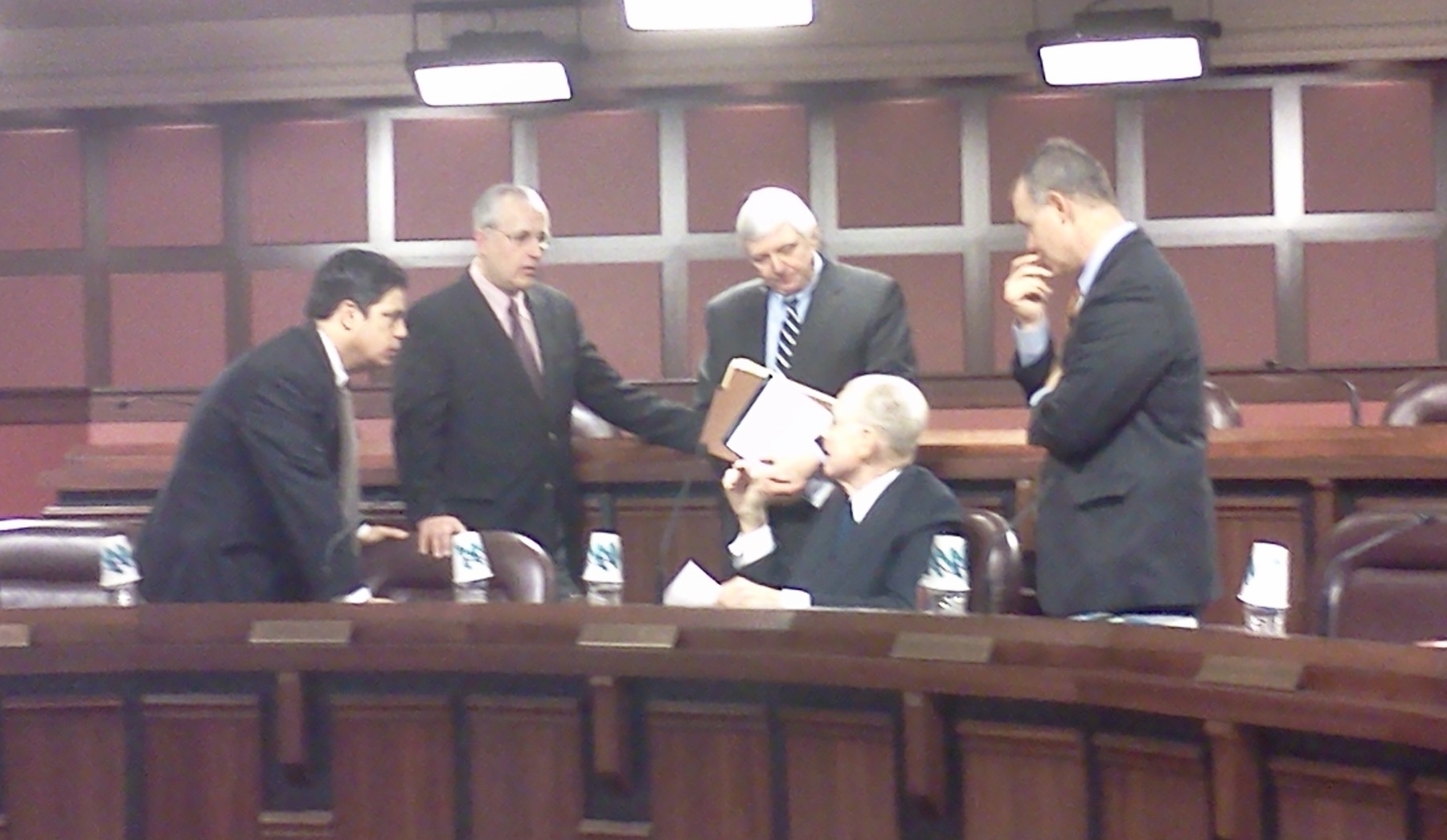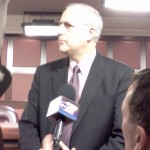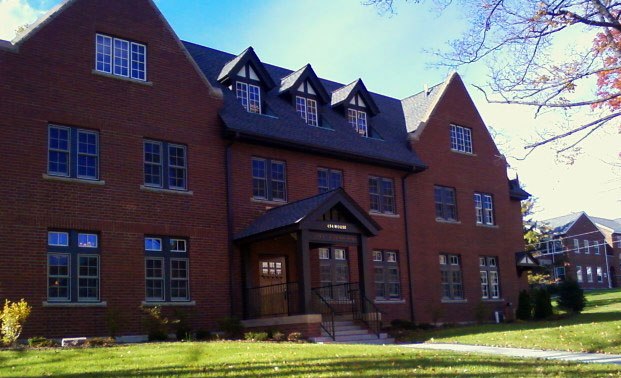Governot Tom Corbett on funding for higher education
/in Ask the Governor, Media, News, Video /by PAMattersNew Legislative Maps Still in Limbo
/in News /by PAMattersThe Legislative Reapportionment Commission has met for the first time since the state Supreme Court threw out its 2011 redistricting plan. No votes were taken and the proceedings lasted only minutes before Chairman Stephen McEwen recessed the meeting until next Tuesday. “It has come close, we’re not there yet,” McEwen said of the legislative leaders’ efforts to arrive at a compromise that can pass constitutional muster with the high court.
Senate Republican Leader Dominic Pileggi (R-Delaware) suggests that the April 24th primary election will be held using the 2001 legislative maps. “There is no way that we can have a new map in place in time for the April 24th primary to occur with the new map.” Pileggi doesn’t foresee legislative action to move the primary date, but did not speculate as to whether additional court action will be taken on the issue.
Republicans have filed legal action that contends use of the 2001 maps would violate the constitutional principles of “one person, one vote,” but Pileggi notes the state Supreme Court has directed them to use existing maps in the existing primary cycle.
Neither Pileggi nor his Democratic counterpart would discuss details of the ongoing negotiations. “All I can tell you is that we’re working together to try to figure out what we can do to incorporate a plan that adheres to the Supreme Court decision and to the constitution,” Senate Democratic Leader Jay Costa (D-Allegheny) told a gaggle of reporters after the meeting.
Costa believes the courts have been very clear that the April 24th primaries need go on with the 2001 lines. “We believe that’s going to be the case.”
State-Related Universities Plead Their Budget Cases
/in News /by PAMattersState-related universities saw near 20% cuts in state support last year. The governor imposed a 5% budget “freeze” mid-year, and Penn State, Pitt and Temple face proposed 30% cuts next fiscal year. “In certain respects, what we’re seeing is the dismantling of a long, long commitment by the Commonwealth of Pennsylvania to public higher education,” University of Pittsburgh Chancellor Mark Nordenberg told the House Appropriations Committee on Wednesday. Nordenberg went on to say the cumulative cuts appear to be pushing the state-related into private institutions.
When asked what the proposed cuts would mean, if they were entirely addressed through tuition hikes, Penn State President Rodney Erickson told the panel that it would be a 9.37% tuition increase. “But I can assure you that we will not do that,” he added.
At Temple, President Ann Weaver Hart says the hypothetical tuition hike would be in the $4,000 dollar range. At Pitt, Chancellor Nordenberg said in-state students would be paying $3,000 dollars more if the cuts were absorbed entirely through tuition increases. But the leaders of all three universities stressed that they continue to look to cut costs, and they would keep tuition hikes as low as possible.
“The unemployment rate among college graduates is less than half the unemployment rate among high school graduates,” Temple President Ann Weaver Hart said as she implored state lawmakers to reconsider another round of deep budget cuts.
Pennsylvania’s fourth state-related university, Lincoln, receives just a fraction of the state support as the larger universities do. Lincoln’s “general support” line item would be level-funded at $11.1-million dollars in the governor’s spending plan.
Pennsylvania Environmental Group links Weather Disasters to Global Warming
/in News /by PAMatters2011 was a record year for weather disasters and Pennsylvania did not go untouched. A new report from PennEnvironment says more than 9 out of 10 Pennsylvanians live in counties affected by federally-declared weather disasters since 2006, from flooding to winter storms. It points some of the blame at global warming.
David Masur, Director of PennEnvironment, says global warming is projected to bring more frequent, heavy downpours and snowfalls. He says heat waves and unusually hot seasons will likely become more common and hurricanes may become more intense and bring greater amounts of rainfall.
Masur says the extreme weather has caused problems for the state’s economy and its public safety.
The report says now is the time to do more to reduce greenhouse gas emissions from power plants, cars and trucks. Masur says the Obama administration is in the process of developing new standards for cars and light trucks and is beginning to move ahead on new standards for coal fired power plants.
Masur also supports three measures before the state legislature, a green buildings bill that has passed the house and is awaiting state senate action, and bills to promote wind energy and further solar energy.
Online Purchases Dominate Revenue Department Budget Hearing
/in News /by PAMattersE-commerce has muddied the waters of an already complex tax code here in the Keystone State, and Revenue Secretary Dan Meuser did his best to clear things up during Appropriations Hearings on Tuesday.
There’s some overlap between two big Department of Revenue priorities in 2012. First, the state is compelling online retailers with a physical presence in PA to collect and remit sales taxes. Pennsylvania consumers are also being encouraged to report the use tax that is due for online purchases when the sales tax is not collected.
“We’re not interested in new taxes,” Secretary Meuser told the Senate Appropriations Committee. “We’re about enforcing the laws that exist.” Combined, the two initiatives are expected to add $49-million dollars to the state’s balance sheet.
Online retailers have been given until September 1st to comply with state nexus laws, while line 25 on the PA-40 tax form will capture consumers’ attention this year. It allows you to report your use taxes for all of those taxable items you may have bought online in 2012. If you don’t have complete records of your purchases, the instructions even provide you with a table through which you can estimate the use tax that is due.
For instance, a tax filer who made between $15,001 and $30,000 dollars in taxable income would pay an estimated $12 dollars in use tax (assuming they don’t live in Philadelphia or Allegheny counties, where the sales & use taxes are higher).
“90% of people pay their taxes in a voluntary, compliant manner,” Meuser says. “So our approach is aggressive education if you will, informing in many many ways.” He tells lawmakers that consumers’ self-reporting of use taxes is expected to account for $7-million of the $49-million dollar figure.
Allegheny College to Award “Prize for Civility”
/in News /by PAMattersThe inaugural Allegheny College Prize for Civility in Public Life will be awarded today at the National Press Club in Washington DC. Allegheny College President James Mullen says it was founded as a way to help restore civility in politics. “As we have looked at American politics we have seen, as everyone else has, the toxicity of the discourse.”
Mullen says all of the studies out of the Meadville -based liberal arts institution indicate that young people are moving away from engaging the political process. He calls that dangerous, and notes that as a college they have an obligation to work toward reversing the trend.
The inaugural award will be presented to political journalists and commentators Mark Shields and David Brooks. “If airlines talked about competing airlines the way that political candidates do – no one would ever fly,” Shields tells us. He contends you can have honest disagreements without being rancorous and vindictive.
Mullen hopes the Prize will highlight cases of great civility, noting that Shields and Brooks set the bar high.
Commownealth Foundation says Pennsylvania’s Public Welfare Spending is Unsustainable
/in News /by PAMattersA new report from the Commonwealth Foundation calls Pennsylvania’s welfare system unsustainable and says it’s hurting those in need. Elizabeth Stelle, policy analyst for the Foundation, says spending is growing faster than the economy and exceeding education appropriations.
Stelle says the report is not about attacking the poor; it’s about preserving benefits for the truly needy. She says the system is very ineffective and largely unaccountable. She says the system is failing the poor. She says they’re not getting out of poverty, the poverty rates are increasing. She says taxpayers really can’t afford the spending trajectory that we’re on.
The report calls for changes to the system to address fraud and waste, eliminate programs that don’t work and expand those that do, and to seek flexibility from the federal government in dealing with program mandates.
Stelle says recent fraud reports, including a fraud ring in Mercer County that claimed more than 750 thousand dollars in benefits, may be the tip of the iceberg.
But Sharon Ward, President of the Pennsylvania Budget and Policy Center, says the Commonwealth Foundation is misinterpreting Department of Public Welfare data.
Ward says the report is seeing something that isn’t there, adding the recession has impacted enrollment in programs like food stamps, unemployment and medical assistance. She says Pennsylvania’s aging population has also pushed medical assistance numbers higher, due to the cost of nursing home care. But Ward says the health care premiums in the state’s public system have grown at a lower rate than private health insurance costs.
Ward adds once the recession is over and people get their jobs back, they expect to see enrollment for food stamps, welfare and medical assistance decline significantly.
Bipartisan Panel Studies PA Lottery Fund
/in News /by PAMattersThe Legislative Budget & Finance Committee has released the first comprehensive study of the Pennsylvania Lottery in 18-years. The study focused on the relationship between the Lottery Fund and the programs it supports for older Pennsylvanians.
The study points out the rapid growth that’s expected in Pennsylvania’s senior citizen population. For instance, seniors are expected to compose 22.5% of the state’s total population by 2030. Today, that number is 15.4%. However, lottery sales are only slated for slight growth in the next five years – attributed almost entirely to the rise of instant games.
The study raises no immediate concerns, but points out that if future lottery sales fall on the low end of projections, funding for services within the state Department of Aging may not be adequate. The Lottery Fund currently supports a variety of programs, everything from the Property Tax/Rent Rebate to Area Agencies on Aging.
The committee’s recommendations include the continued expansion of the Pennsylvania Lottery’s retail network, and a call for the General Assembly not to add anything to the list of programs already funded by lottery dollars.
The study was conducted per the direction of HR 106, which passed the House unanimously back in June. “I am pleased that there appears to be no immediate danger of senior citizens losing benefits,” says State Rep. Martin Causer, the resolution’s sponsor. “However, our population is aging, and if lottery sales continue to stagnate, we could be faced with some difficult decisions in the next decade.”
Radio PA Roundtable 02.17.12
/in Audio, Media, News, Radio PA Roundtable /by PAMattersRadio PA Roundtable is a 30-minute program featuring in-depth reporting on the top news stories of the week. Professionally produced and delivered every Friday, Roundtable includes commercial breaks for local sale and quarterly reports for affiliate files.
Click the audio player below to hear the full broadcast:
[audio:https://s3.amazonaws.com/witfaudio/radiopa/Roundtable02-17-12.mp3]Welcome to PAMatters.com, a new source for news and commentary from Pennsylvania’s capital. In addition to video, audio and pictures from the stories and events that affect YOU, you’ll also get some behind-the-scenes analysis via blogs from our award-winning staff of journalists.











